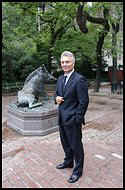 |
 |
| Want to send this page or a link to a friend? Click on mail at the top of this window. |
| Posted June 27, 2003 |
Evil's Human Faces |
Infamous Dictators Open Up to Italian Journalist |
 |
 |
Helayne Seidman for the Washington Post |
| Riccardo Orizio, the author, left, and right, Jean-Bedel Bokassa, one of the evil's human faces. |
| ______________________________ |
By Alona Wartofsky, Special to The Washington Post |
NEW YORK -- Italian journalist Riccardo Orizio is an affable man with lovely manners. He shakes your hand with evident pleasure and makes charming small talk. The interview will take place nearby, in the Upper East Side apartment of a former colleague. On the way, he offers to carry your bag. Twice.
You can't help wondering whether Orizio's ingratiating manner helped him in the reporting of his fascinating new book, "Talk of the Devil: Encounters With Seven Dictators." For years, Orizio prowled the globe looking for deposed dictators, several of whom proved somewhat elusive. Once he found his subjects, Orizio spent hours or days with them -- subject to their availability, of course -- and tried to learn whether forced retirement and the benefits of hindsight had any effect on their consciences.
| _____________________________ |
| Orizio said it was hard not to feel "some sort of sympathy" for each of the dictators he met. |
| _____________________________ |
Not surprisingly, none of Orizio's ignominious seven was contrite. The Central African Republic's Jean-Bedel Bokassa, Albania's Nexhmije Hoxha and Uganda's Idi Amin shrugged off any wrongdoing. Others -- Ethiopia's Mengistu Haile-Mariam, Poland's Wojciech Jaruzelski and Serbia's Mira Markovic (wife of Slobodan Milosevic) -- insisted that history will prove them right. Jean-Claude Duvalier asked Orizio whether Haiti is really any better off today than it was during his rule.
But what was surprising, says Orizio, is how much empathy he felt for his subjects. "Even when you know that they are monsters and you know all about their past, when you meet them face to face . . . it's difficult not to feel some sort of human compassion for them," he says.
"When you -- what is the word? -- dissect the life of somebody in one thousand, one million little pieces, then it's very, very difficult not to find a few pieces that you feel comfortable for, or feel some sort of sympathy for," says Orizio.
Take, for example, Idi Amin, living in Saudi Arabia, where the Saudi government pays him a salary, reports Orizio, "in the name of 'Islamic solidarity.' " Amin, responsible for more than 300,000 deaths during his reign, told Orizio that he is no longer interested in politics and now dedicates himself to religion. He fills his days by reading the Koran, playing the organ, swimming and fishing. When Orizio asked him if he felt any remorse, Amin replied, "No. Only nostalgia."
Orizio calls Amin the "craziest" of the ex-dictators he interviewed. "But still, if you read the telexes that he used to send to Queen Elizabeth, or Richard Nixon . . . there is a highly sardonic, ironic, farcical element in many of those messages. It's like a Mel Brooks movie. It makes you laugh, and for a moment, you forget about the suffering, the sufferers, the blood, the corpses, the people dead, the people killed.
"When you read the telex that says to the queen, 'Dear Liz, if you want to know a real man, come to Kampala,' or to Richard Nixon, 'I hear you have troubles with this problem called Watergate, but you know what, when a leader has problems with some politicians, they simply should be killed. That's how you should deal with it. I know it's a bit harsh, but believe me, that's how we do things here and they work out quite well.' "
Orizio laughs. "It's difficult to avoid that moment where you smile and say, 'Okay, well, that telex was not bad at all.'
"(He may be extremely polite, but Orizio possesses a dark sense of humor. In the chapter on Bokassa, who was accused of eating several of his political opponents, the author manages to work in the phrase "fillet of opposition leader.")
Something else that Orizio found surprising was that when talking with his "devils," he would occasionally find himself in unwinnable political debates. "Even if they're monsters and they are unreasonable and have been unreasonable, they're still able to make a political point. Or, let's say, to ask me questions that I found very difficult to answer," he says.
"They talk about double standards. They say, 'You in the West . . . always need symbols. And you use me -- you use my name in a highly symbolic way. But are you sure that I was the only one doing what you accuse me of doing? Or in other words, why are you supporting other people that basically are doing or have been doing just what I did, and why don't you label them as monsters and you label me as a monster?' "
Before Orizio embarked on this project, he served as London correspondent for the Italian newspaper La Repubblica, and prior to that he worked in Atlanta on a joint venture between La Repubblica and CNN known as CNN Italia. He wrote one book previously, "Lost White Tribes: Journeys Among the Forgotten," about white enclaves in former colonial territories. In the preface to "Talk of the Devil," he recounts that for many years, he carried two newspaper clippings in his wallet. Both were about African dictators who had been accused of cannibalism: Bokassa and Amin.
Later, his list of deposed despots grew. Orizio selected Jaruzelski in part because he "wanted a general with sunglasses in my book, and he was available for an interview," he says with a wry smile. "The dark sunglasses we've seen on many Latin American dictators' faces for so many years -- these were so symbolic."
While collecting ex-dictators, Orizio came to one dismaying realization: how quickly most of the world had forgotten them. "Our memory span is very, very short, and we are ready to forget -- meaning that we are maybe also ready to forgive -- most of the killing fields littering our contemporary history," he says sadly.
"I'm pretty sure in 10 years' time, you stop any college student and say, 'Do you remember Saddam Hussein?' and he will say, 'Saddam who?' And we staged a war; we killed and got killed, all in the name of one monster that needed to be removed," he says. "It's incredible how a certain time distance puts everything in a completely different perspective. You know, time is the best ally that these deposed, disgraced dictators have."
Orizio, 41, has been visiting the United States to promote the book with signings and lectures, but by the time you read this, he'll be back at his new home in Kenya's Masai Mara wildlife reserve.
Six months ago, after he finished "Talk of the Devil," Orizio quit journalism. He had been going on safaris as a tourist for more than a decade. Over the years, he says, his passion for the African wilderness outgrew his passion for journalism.
So to the incredulity of their friends, colleagues and relatives, he and his British wife left London and moved to the remote bush country of the Masai Mara, where they are building a small but luxurious safari lodge. Orizio will work as a safari guide, while his wife, a physician, is launching a medical project for nearby Masai settlements.
"You're in the middle of nowhere, meaning no roads, no electricity, no water. No mail, no telephone. No nothing. And you build your own little paradise," he says. For Orizio, paradise translates to satellite e-mail and the luxury of eating breakfast with 25 elephants, and, he says, "having all those elephants all to yourself, without being bothered by any other human being, any other noise, any element of so-called civilization."
Sitting on the coffee table before him is an album of photographs taken at and around his lodge. Interspersed with pictures of simple but elegant rooms are shots of lions, zebras and a hippopotamus. Ever obliging, Orizio, if asked, will imitate the "hu-hu-hu-huuuu" sound that hippos make.
The conversation turns to recent news reports about Iraq's Saddam Hussein, and the question is raised: Will he write about Saddam someday?
"No, I think I'm done with dictators," he says firmly. "Any update would be a full-time job for the rest of my life because there are so many dictators who are just waiting to be deposed and disgraced. It would be an endless update."
His eyes rest briefly on his photo album, though he seems to be thinking about something else. "But I am fascinated by the subject of dictatorships, and I've been to a place called Kalmykia in the Russian Federation. It's one of the independent republics," he says. "It's a bizarre place ruled by a very bizarre chess champion who's imposing Buddhism and chess as the two national religions. So it's an incredible place, so I might do something on that subject."
© 2003 The Washington Post Company. Reprinted from The Washington Post of June 24, 2003.
| Wehaitians.com, the scholarly journal of democracy and human rights |
| More from wehaitians.com |